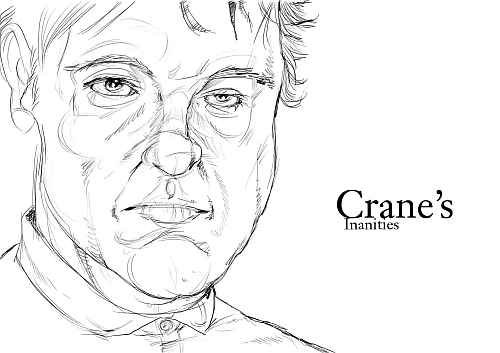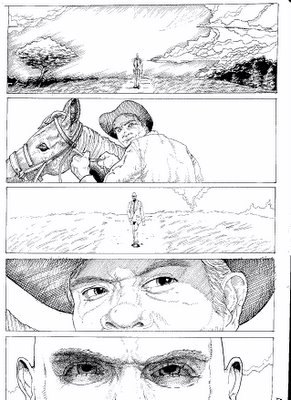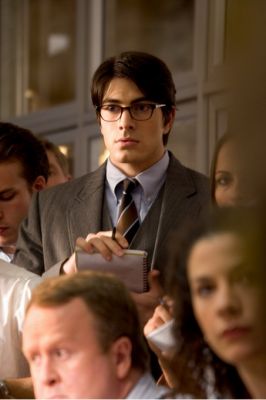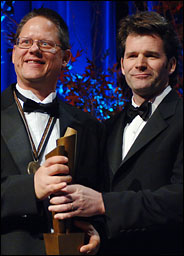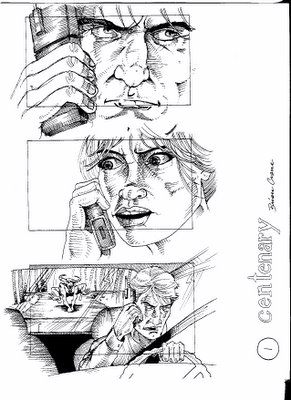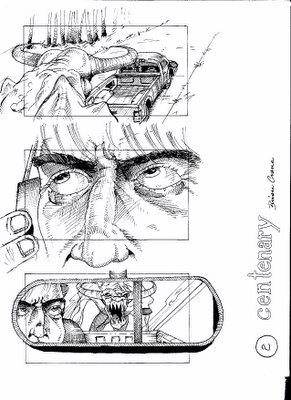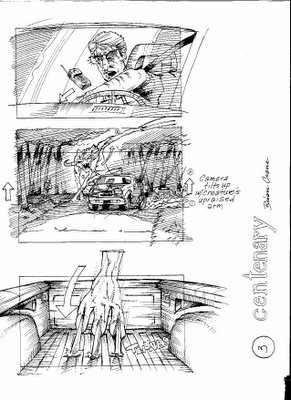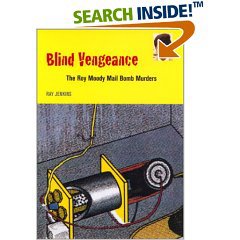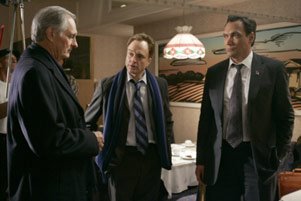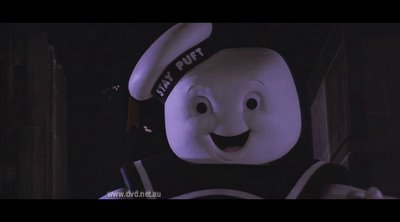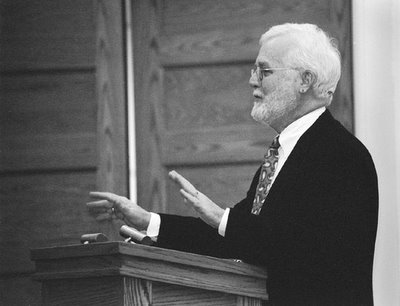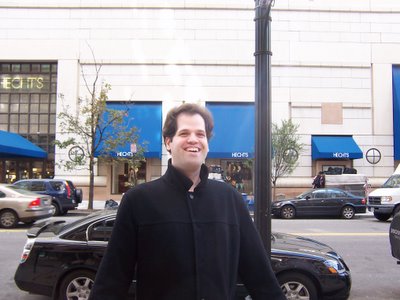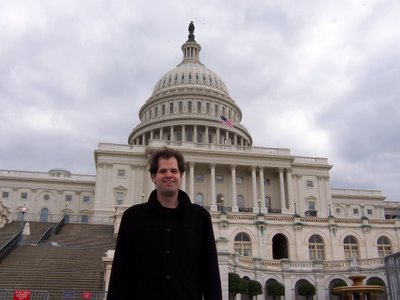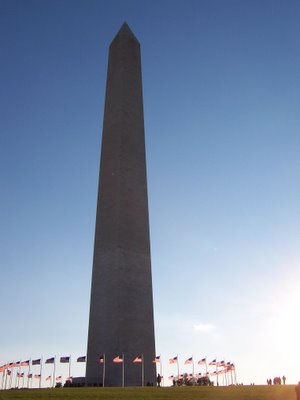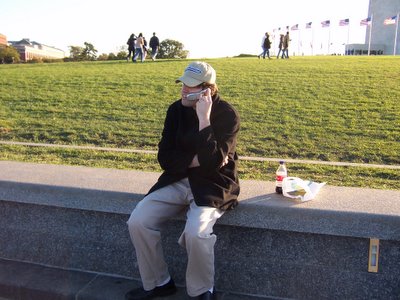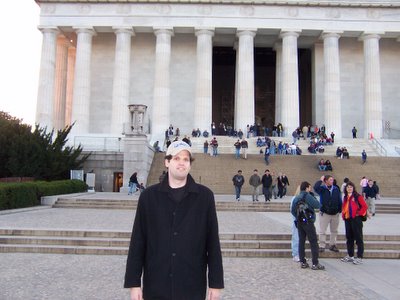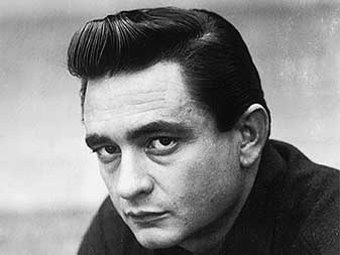
Hello everybody. Hope everyone had an awesome Thanskgiving. I'm back after the longest hiatus in the long, long history of the Inanities. Yeah, I know. I'm as disappointed as you are.
Anyway, over the long weekend, I saw
Harry Potter and the Goblet of Fire as well as
Walk the Line.
Harry Potter was very good, though, while watching this movie, I was more aware of the storylines and moments the filmmakers cut out of Rowling's book than I had been during the previous three. Don't know if that's a good or bad thing, or if I just remembered this book better. I read an interview with Steve Cloves today. Cloves is the screenwriter who adapted the four books so far but opted out of adapting the next book in the series,
Harry Potter and the Order of the Phoenix. He apparently began to feel Potter-withdrawal symptoms because his life, suddenly, no longer revolved around a bunch of British kids named Harry, Ron and Hermione. So when he read the most recent book,
Half-Blood Prince, he got excited about the story all over again and called Warner Bros. to ask if he could do the next one, and they said sure -- apparently they were happy to have two screenwriters working simultaneously on adapting Potter books because the studio and the whole production team are very aware that time is running out for the cast they have. They're trying to film the next two as close to back to back as possible so they don't have to recast, because if they do, Klove says -- well, take a look at
the article. Blogger doesn't let me copy and paste right into the blog for whatever reason, so, you know.
Anyway,
Walk the Line was very good. James Mangold did a great job -- he was smart enough to get out of the way of the story and let the actors do their thing and not clutter the film with showy camera angles and stylized editing. Joaquin Phoenix does a great job as Johnny Cash but he doesn't go exactly the way that Jamie Foxx did with Ray Charles -- Phoenix does more of a
version of Cash -- sometimes he throws in certain Cashism's, like the sneer and the winks, but it never really feels like Phoenix is trying to channel Cash, and it works just fine for the movie, which is all that really matters. Though when it comes award time, the Academy may not give the Best Actor award to Joaquin -- they tend to like their depictions of real-life people to be as close to dead-on impersonations as the actors can get. Thus, the win for Jamie Foxx for
Ray, the win for Ben Kingsley for
Gandhi, and the nomination for Anthony Hopkins for
Nixon (but surprisingly, no nomination for Jim Carrey's dead-on impersonation of Andy Kauffman -- maybe their apparent hatred of Jim Carrey trumps their love for impersonations. Hmmm) We'll see. Maybe the other dead-on impersonation will take Best Actor -- Philip Seymour Hoffman as
Capote. I liked both performances in both movies.
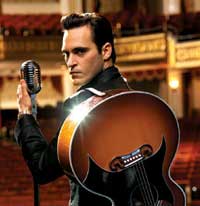
Comparisons to
Ray are inevitable but also in this case, entirely warranted. James Mangold doesn't seem particularly eager to distance his movie from that one, in either style or tone, and why should he? Ray Charles and Johnny Cash, like a lot of super-famous musicians, had similar trajectories.
Walk the Line is very much like a white version of
Ray. It had everything
Ray had: dirt-poor rural upbringings, the death of a family member that scars them for the rest of their lives, womanizing, and drug abuse, but one thing
Walk the Line does
not have, is the long shadow of racism that pervaded almost every frame of
Ray. That
Walk doesn't have that pervasive tension isn't necessarily a detractor, I think. Is
Walk the Line better than
Ray? It's tighter than
Ray structurally, but
Walk doesn't feel as rich or as lively as
Ray, and that may be in part because of the personalities involved -- Ray Charles was an exuberant on-stage personality, whereas Johnny Cash seemed to be more of a shy, reserved performer, but that's just from my own 28-year old perspective -- he was definitely not a musician of my generation. I wasn't really aware of Johnny Cash as anything more than a peripheral country musician who'd been famous since the time of the dinosaurs until he started to get some acclaim in the late nineties from "hip" modern music critics (like the guys at Rolling Stone) for his body of work. I guess everyone was starting to realize that Johnny Cash was getting old and so some reevaluation was in order -- to understand his place in music history and the Rock and Roll firmament. According to the mainstream rock critics, Johnny Cash was either
becoming a crossover artist in his later years, or he already was and they were finally recognizing that fact, I don't remember. And then, a few years ago, there was the "Hurt" video, where Johnny Cash covered the song originally written and performed by Trent Reznor of Nine Inch Nails. I don't know if Marc Romanek will make a better film in his life, but I kind of doubt it. Filmed after Cash had become gravely ill and before his wife, June Carter Cash, died, it's shocking and painfully honest. I think it probably helped get
Walk the Line made.
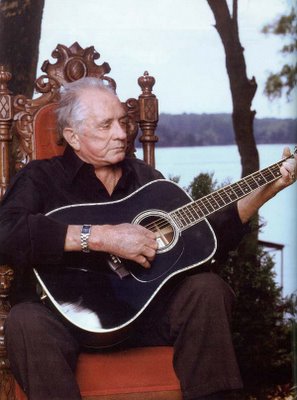
The movie's kind of imbedded itself in my head since I saw it and I wanted to talk about it some. I downloaded some Cash songs in the past couple of days: "Walk the Line", "Folsom Prison Blues", "Ring of Fire". They're definitely in that country tradition of songs primarily interested in telling stories. His songs, at least those few songs I listed, aren't really to my taste, but they're good, I think -- I guess my interest in Johnny Cash isn't really fueled by a great love for his music, but rather because I admire him for appearing in Romanek's video in his condition (I believe he was then recovering from a debilitating stroke -- he looks markedly worse in the video than he does in the included photo of the elder Cash), and for recording "Hurt". Though the lyrics weren't his, he infused Reznor's rock-dirge with a gravitas Reznor never got close to. It's rare to find that musician who has something musically worthwhile to say all the way to the bitter end of their careers, but Cash appears to be one of them. I wished they'd touched on the video in some way in
Walk the Line, but I'm guessing Mangold didn't want to let Romanek's work infringe on his own, no matter how apt it might have been. Anyway. If you haven't already, I would reccomend both
Harry Potter and
Walk the Line. More inanities tomorrow.
 I drew this two nights ago. It benefits from reduction, believe me. After I'd drawn it, I could tell there was something very wrong with it: the girl in the drawing and the girl in the photo were obviously two different people. So, last night, I returned to the drawing, erased her eyes (because that was the problem area) and redrew them. By doing so, other things got screwed up. Nothing so drastic as to make me think I'd drawn some new, only vaguely humanoid species, but enough to make me think I was never going to get the woman's face right. Anyway, I cleaned it up, changed her jawline, moved her nose a little to the left, lifted her smile, reshaded in places -- generally got it as close as I could to the photo, and this is the result. I know -- still two different people. Oh well. Practice makes perfect I guess. Just needs a serious tweaking, but I can't figure out where or how. Waah.
I drew this two nights ago. It benefits from reduction, believe me. After I'd drawn it, I could tell there was something very wrong with it: the girl in the drawing and the girl in the photo were obviously two different people. So, last night, I returned to the drawing, erased her eyes (because that was the problem area) and redrew them. By doing so, other things got screwed up. Nothing so drastic as to make me think I'd drawn some new, only vaguely humanoid species, but enough to make me think I was never going to get the woman's face right. Anyway, I cleaned it up, changed her jawline, moved her nose a little to the left, lifted her smile, reshaded in places -- generally got it as close as I could to the photo, and this is the result. I know -- still two different people. Oh well. Practice makes perfect I guess. Just needs a serious tweaking, but I can't figure out where or how. Waah. I could go on, but even I know this drawing isn't worth all of this deconstruction. So let's move on.
I could go on, but even I know this drawing isn't worth all of this deconstruction. So let's move on.